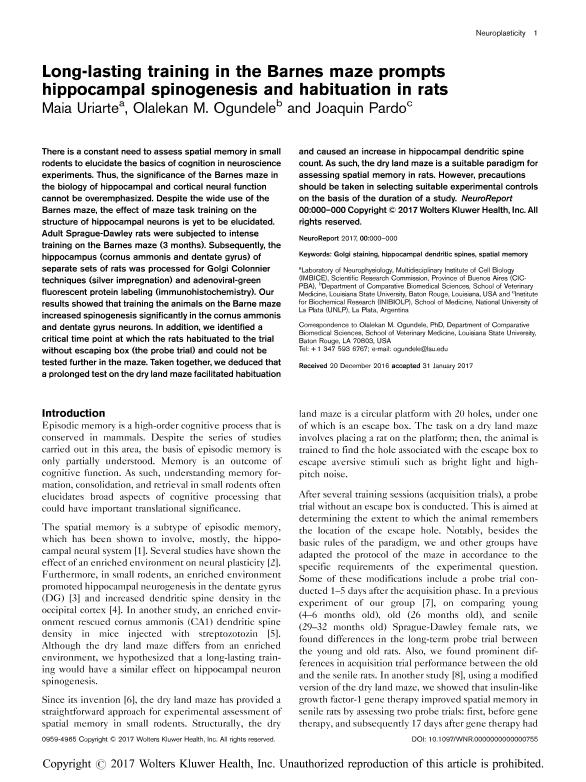Artículo
Long-lasting training in the Barnes maze prompts hippocampal spinogenesis and habituation in rats
Fecha de publicación:
04/2017
Editorial:
Lippincott Williams
Revista:
Neuroreport
ISSN:
0959-4965
Idioma:
Inglés
Tipo de recurso:
Artículo publicado
Clasificación temática:
Resumen
There is a constant need to assess spatial memory in small rodents to elucidate the basics of cognition in neuroscience experiments. Thus, the significance of the Barnes maze in the biology of hippocampal and cortical neural function cannot be overemphasized. Despite the wide use of the Barnes maze, the effect of maze task training on the structure of hippocampal neurons is yet to be elucidated. Adult Sprague-Dawley rats were subjected to intense training on the Barnes maze (3 months). Subsequently, the hippocampus (cornus ammonis and dentate gyrus) of separate sets of rats was processed for Golgi Colonnier techniques (silver impregnation) and adenoviral-green fluorescent protein labeling (immunohistochemistry). Our results showed that training the animals on the Barne maze increased spinogenesis significantly in the cornus ammonis and dentate gyrus neurons. In addition, we identified a critical time point at which the rats habituated to the trial without escaping box (the probe trial) and could not be tested further in the maze. Taken together, we deduced that a prolonged test on the dry land maze facilitated habituation and caused an increase in hippocampal dendritic spine count. As such, the dry land maze is a suitable paradigm for assessing spatial memory in rats. However, precautions should be taken in selecting suitable experimental controls on the basis of the duration of a study.
Palabras clave:
Golgi Staining
,
Hippocampal Dendritic Spines
,
Spatial Memory
Archivos asociados
Licencia
Identificadores
Colecciones
Articulos(IMBICE)
Articulos de INST.MULTIDISCIPL.DE BIOLOGIA CELULAR (I)
Articulos de INST.MULTIDISCIPL.DE BIOLOGIA CELULAR (I)
Citación
Uriarte Donati, Maia; Ogundele, Olalekan Michael; Pardo, Joaquin; Long-lasting training in the Barnes maze prompts hippocampal spinogenesis and habituation in rats; Lippincott Williams; Neuroreport; 28; 6; 4-2017; 307-312
Compartir
Altmétricas




